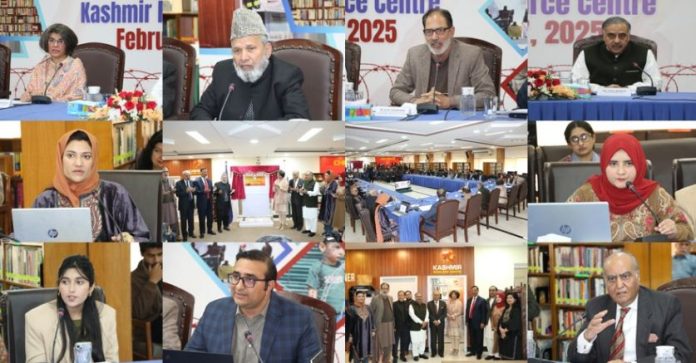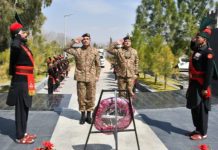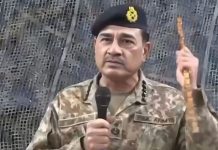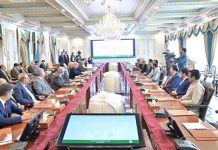ISLAMABAD, FEB 7 /DNA/ – The India Study Centre (ISC) at the Institute of Strategic Studies Islamabad (ISSI) organized a Seminar in commemoration of the Kashmir Solidarity Day, Titled “Kashmir Solidarity Day: A Commitment to Peace, Rights and Self-Determination”, the event included inauguration of the ‘Kashmir Resource Centre’ – a first-of-its-kind at a national think-tank. Ambassador Amna Baloch, the Foreign Secretary of Pakistan, was the chief guest on the occasion.
Expressing her views, the Foreign Secretary said the Kashmiri people have not been able to exercise their fundamental right of self-determination due to continued Indian intransigence. Today, the true representatives of the Kashmiri people remain behind bars, with the total number of political prisoners being in the thousands. Iconic Kashmiri leader Syed Ali Shah Geelani died during detention. As if the imprisonment of popular leaders was not enough, the Indian authorities have been banning the political parties that represent the true aspirations of the Kashmiri people. So far, 14 political parties have been outlawed. History bears witness that India’s continued occupation of large parts of Jammu and Kashmir has threatened regional peace and stability on a number of occasions. The Foreign Secretary stressed that Pakistan believes in peaceful co-existence with its neighbours. However, a peaceful settlement of the Jammu and Kashmir dispute, in accordance with the UN Security Council Resolutions and aspirations of the Kashmiri people, is essential for lasting peace in South Asia. The Foreign Secretary commended the ISSI for establishing a much-needed ‘Kashmir Resource Centre’ and expressed her hope that this Centre will offer a useful repository of knowledge for researchers, practitioners and lay readers alike.
Director General ISSI Ambassador Sohail Mahmood, in his remarks, said that while Pakistan and the Kashmiris remain resolute in their quest for a solution based on the Security Council resolutions, India has long reneged on its solemn commitments. The international community hesitates to play its rightful role, either because of geo-strategic considerations or corporate interests. Meanwhile, India’s conduct in the occupied territories is marked by heartless cruelty and repression, political manipulation, demographic engineering, and an onslaught of misinformation and disinformation. In order to deceive the world community and secure legitimacy for its crimes, India has been trying to paint the legitimate Kashmiri resistance struggle as “terrorism”, leveling allegations of “cross-border terrorism” against Pakistan, and projecting a false sense of ‘normalcy’ in IIOJK since 5 August 2019. Ambassador Sohail Mahmood stressed that for the Kashmiris and the people of Pakistan, it is imperative to reject any narratives of despair and to keep faith in the prospects of a fair settlement of the Jammu and Kashmir dispute.
While highlighting the importance of the newly-established Kashmir Resource Centre (KRC) at ISSI, Ambassador Sohail Mahmood hoped that it will play a meaningful part in creating increased awareness and understanding and promote informed discourse, particularly among the youth of Pakistan about this most intractable of global issues from the last century. He also thanked the Ministry of Foreign Affairs for its support in the establishment of KRC.
Earlier, in his introductory remarks, Dr. Khurram Abbas, Director India Study Centre said that every year, Pakistan observes Kashmir Solidarity Day to express unwavering support for the Kashmiri people’s right to self-determination, as enshrined in the UN’s Charter as well as the Security Council resolutions. Indian occupied forces in Indian Illegally Occupied Jammu and Kashmir (IIOJK) are responsible for many untold atrocities but they could not break the will of the Kashmiri people for their right of self-determination.
The Seminar featured a line-up of distinguished speakers who shared their perspectives on the Kashmir issue. Speaking from the perspective of a Pakistani youth, Ms. Fatima Waheed said that the revocation of Article 370 and 35A was a calculated step towards erasing Kashmir’s identity – a violation of international law and United Nations Security Council resolutions. She questioned that while the world claims to value democracy and justice, why Kashmiris are being denied both?
Ms. Tayyaba Khurshid, Research Officer at CISS (AJK), shared her perspective as a Kashmiri youth. She said that there is a strong bond between AJK and Pakistan. The youth in AJK have hopes and possibilities for a better future, which is not the case with the Kashmiri youth under Indian occupation. India remained active in spreading falsehoods and sow disaffection among the youth. Both AJK and Pakistan must join hands to thwart Indian designs.
Ms. Naila Kyani, a social and political analyst and a seasoned anchorperson, highlighted the resilience and role of Kashmiri women in the freedom struggle. She said that Kashmiri women have shown remarkable resilience in the face of brutal repression and systemic violence. For over seven decades, Kashmiri women have led protests, sit-ins, and resistance movements. She highlighted the sacrifices of women like Asiya Andrabi, Anjum Zamrud Habib and Fehmeeda Sofi who have been in Indian prison for years. She also highlighted movements like ‘Wanan Zanan’ that provide safe spaces to women through storytelling, literature and poetry.
Mr. Altaf Hussain Wani, Chairman, Kashmir Institute of International Relations, spoke on Modi’s policies in IIOJK. He said that when Modi assumed power in 2014, he started rounding up Kashmiri political leaders and sent them to jails so that their voices does not reach a common Kashmiri. While giving the example of renowned human rights activist Khurram Parvez, who has been in Indian captivity for more than three years, Mr. Wani said that free speech has been criminalized in Jammu and Kashmir under Indian occupation. The hallmark of Modi’s policies in IIOJK was the revocation of Articles 370 and 35A, which was done to implement the ‘Hindutva’ agenda, bring about demographic change in IIOJK, and ‘Indianize’ Kashmir, which the Kashmiris will not accept.
Mr. Ghulam Muhammad Safi, Convener, All Parties Hurriyat Conference (APHC), highlighted various dimensions of the Kashmir dispute that included human rights violations as Kashmiris are being killed and tortured in custody of Indian forces. Rape is being used as a weapon. He said that these violations of human rights are cause-related phenomena as India wants to silence the Kashmiri people and deter them from demanding their right to self-determination. He underlined the importance of UN Security Council resolutions for solution of the Jammu and Kashmir dispute. He also emphasized that any country that is a strategic partner of India must not be allowed to mediate and that any talks on the resolution of Kashmir dispute must include Kashmiri leadership.
In his concluding remarks, Chairman Board of Governors Ambassador Khalid Mahmood said that the right of self-determination is a fundamental human right and Kashmiris have this right under the UN Charter, international law, and Security Council Resolutions. A number of human right organisations have highlighted the ongoing human rights abuses in IIOJK. Despite India’s oppression and its settler- colonial agenda, the resilience of the people of IIOJK has not shaken and Pakistan stands behind the Kashmiri people in their just struggle. Time is not far off when the people of Jammu and Kashmir will be exercising their right to self-determination.
The Kashmir Resource Center is envisaged to be a resource hub aimed at promoting awareness and facilitating rigorous research, informed discourse, dialogue and advocacy on this issue of national importance and international significance.












